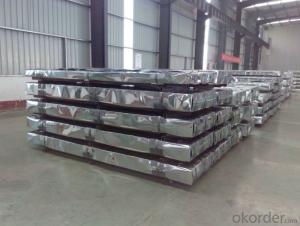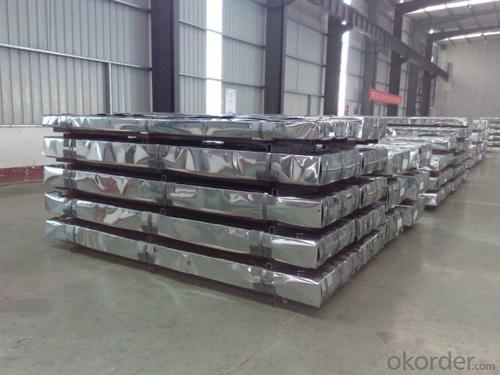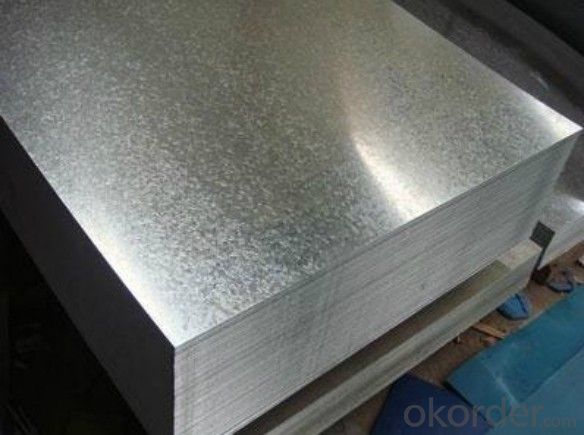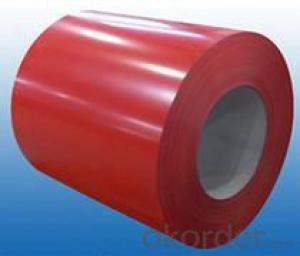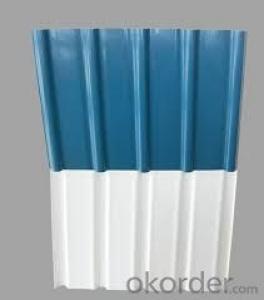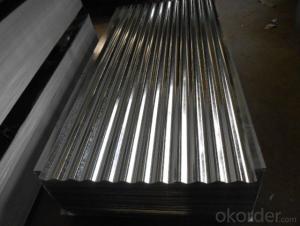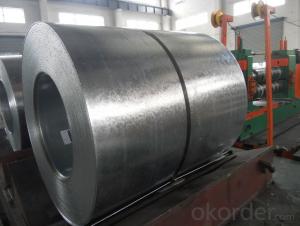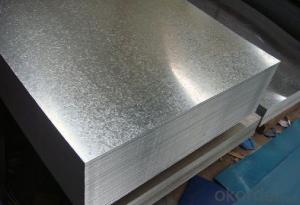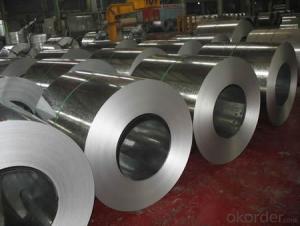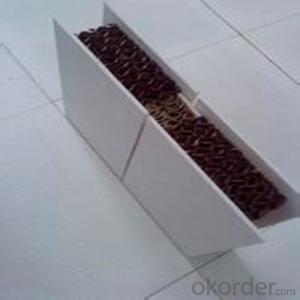Hot Dipped Galvanized Steel Sheets
- Loading Port:
- China Main Port
- Payment Terms:
- TT OR LC
- Min Order Qty:
- -
- Supply Capability:
- -
OKorder Service Pledge
Quality Product, Order Online Tracking, Timely Delivery
OKorder Financial Service
Credit Rating, Credit Services, Credit Purchasing
You Might Also Like
Product Description:
Standard: AISI, ASTM, BS, DIN, GB, JIS
Steel Grade: Q195
Thickness: 0.14mm untill 4.00mm
Place of Origin: Shandong, China (Mainland)
Technique: Cold Rolled
Surface Treatment: Zinc coated
Application: Roof, Door,Building
Model Number: GI-3
Width: 50-1500mm
Length: with coil (150 untill 900mater)
Zinc quantity: 40g/m2 untill 275g/m2
Thickness: 0.14mm ----4.00mm
Spangle: Bright unoiled
Width: 50mm---1500mm
Coil ID: 508mm or 610mm
Coil Weight: 2 ton untill 5 ton
- Q: Can steel sheets be bent or shaped?
- Yes, steel sheets can be bent or shaped using various techniques such as rolling, pressing, or folding.
- Q: What are the different surface finishes for galvalume steel sheets?
- The different surface finishes for galvalume steel sheets include regular spangle, minimized spangle, and zero spangle. Regular spangle has a shiny, reflective surface, minimized spangle has a less noticeable spangle pattern, and zero spangle has a smooth, matte finish.
- Q: How do steel sheets handle thermal insulation?
- Steel sheets are not good thermal insulators as they conduct heat very well.
- Q: Can steel sheets be used for window frames?
- Yes, steel sheets can be used for window frames. Steel is a strong and durable material that can provide stability and security to window structures.
- Q: Can steel sheets be used in high-temperature applications?
- High-temperature applications can make use of steel sheets, as steel possesses exceptional heat resistance and can endure high temperatures while retaining its structural integrity. The suitability of steel for such applications is heavily influenced by its specific type and composition. Stainless steel or heat-resistant steel, for instance, are specifically engineered to withstand exceedingly high temperatures and are widely utilized in industries like aerospace, automotive, and manufacturing. These steel sheets are applicable in various high-temperature settings including furnaces, boilers, exhaust systems, and heat exchangers, among others. Nevertheless, it is crucial to consider factors such as the precise temperature range, duration of exposure, and the presence of any potentially corrosive elements in the high-temperature environment to ensure the selected steel sheet is suitable for the intended purpose.
- Q: Can steel sheets be used in oil and gas applications?
- Yes, steel sheets can be used in oil and gas applications. Steel is a commonly used material in the industry due to its high strength, durability, and resistance to corrosion. It is frequently used in the construction of pipelines, storage tanks, and other equipment for the oil and gas sector.
- Q: How can the steel plate of flat welding 10mm make its deformation smaller?
- High technical content is: two side groove, one side of the groove is deep, one side of the groove is shallow, the depth of difference is a seam, the two sides welding at the same time, pay attention to the deep groove of this face to be in the lead.Other ways to prevent the in-plane deformation of steel plate are: back welding, skip welding and so on.
- Q: What is the difference between a standard and high-strength steel sheet?
- The difference between a standard and high-strength steel sheet lies in their respective mechanical properties and performance characteristics. Standard steel sheets are often made from low to medium carbon steel, typically with a yield strength of around 250 MPa (megapascals). These sheets are commonly used in applications that do not require extreme strength or resistance to deformation. On the other hand, high-strength steel sheets are manufactured with a higher carbon content and alloying elements such as manganese, chromium, or nickel. This composition enables them to have significantly higher yield strengths, ranging from 350 to 1,000 MPa or even more. As a result, high-strength steel sheets offer enhanced resistance to deformation, higher tensile strength, and improved durability. Due to their superior mechanical properties, high-strength steel sheets are often selected for applications that demand increased strength-to-weight ratios, such as automotive components, structural parts, and heavy machinery. These sheets can withstand higher loads, endure extreme conditions, and provide better protection in case of impact or sudden forces. While standard steel sheets are more readily available and less expensive, high-strength steel sheets are preferred in situations where superior strength and performance are necessary. However, it is important to note that high-strength steel sheets may be more challenging to form, weld, or machine due to their increased hardness. Therefore, careful consideration of the specific application requirements is crucial when choosing between standard and high-strength steel sheets.
- Q: What are the different joining methods for steel sheets?
- There are several different joining methods for steel sheets, including welding, bolting, riveting, and adhesive bonding. Welding involves melting the edges of the steel sheets and fusing them together, creating a strong and permanent bond. Bolting involves using screws or bolts to connect the steel sheets, providing a secure and adjustable connection. Riveting involves using rivets to connect the steel sheets by deforming the rivet to create a mechanical bond. Adhesive bonding involves using specialized adhesives to bond the steel sheets together, creating a strong and lightweight connection.
- Q: Can steel sheets be used for manufacturing containers or packaging?
- Yes, steel sheets can be used for manufacturing containers or packaging. Steel is a durable and strong material that can provide adequate protection and security for various products during transportation and storage. Additionally, steel sheets are resistant to corrosion, making them suitable for long-term use in demanding conditions.
Send your message to us
Hot Dipped Galvanized Steel Sheets
- Loading Port:
- China Main Port
- Payment Terms:
- TT OR LC
- Min Order Qty:
- -
- Supply Capability:
- -
OKorder Service Pledge
Quality Product, Order Online Tracking, Timely Delivery
OKorder Financial Service
Credit Rating, Credit Services, Credit Purchasing
Similar products
Hot products
Hot Searches
Related keywords
